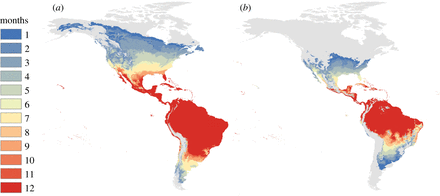
GAINESVILLE, FL – A University of Florida Medical Geography researcher recently participated in a study that found that current estimates of Zika virus transmission vastly over predict its possible range. Temperature is a major driver of vector-borne disease transmission, but current transmission models rely on untested assumptions about life history of Zika infected Aedes aegypti mosquitoes. Previous models of Zika transmission were based on similarities between Zika and dengue fever.
The study, led by Dr. Courtney Murdock from the University of Georgia, examined the influence of temperature on Zika transmission in lab-reared Aedes mosquitoes at eight different constant temperatures. Zika transmits optimally at a temperature similar to dengue, but the lowest possible transmission temperature of Zika is 5 degrees centigrade warmer than dengue. As global average temperatures increase under climate change the range of Zika will expand north and into longer transmission seasons, but some areas that are currently suitable for Zika transmission will no longer support transmission.
UF Medical Geography professor Dr. Sadie Ryan used the temperature relationships to make updated models and maps, which she compared with previous transmission models. “These maps show that the predicted area for year round risk of Zika transmission is over 6 million square kilometers smaller than previous models would predict,” said Ryan. “This shows that Zika is not dengue and we need to have specific transmission models for specific diseases.”
The findings have been published in a paper titled Temperature drives Zika virus transmission: evidence from empirical and mathematical models in Proceedings of the Royal Society B.
The study was part of a collaboration between UF’s Dr. Sadie Ryan and Dr. Calistus Ngonghala, the CDC Southeastern Center of Excellence in Vector Borne Diseases, the University of Georgia, as well as investigators from Stanford University and Harvard Medical School.